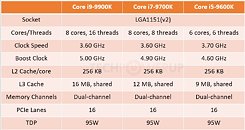Monday, July 23rd 2018

Top Three Intel 9th Generation Core Parts Detailed
Intel is giving finishing touches to its 9th generation Core processor family, which will see the introduction of an 8-core part to the company's LGA115x mainstream desktop (MSDT) platform. The company is also making certain branding changes. The Core i9 brand, which is being introduced to MSDT, symbolizes 8-core/16-thread processors. The Core i7 brand is relegated to 8-core/8-thread (more cores but fewer threads than the current Core i7 parts). The Core i5 brand is unchanged at 6-core/6-thread. The three will be based on the new 14 nm+++ "Whiskey Lake" silicon, which is yet another "Skylake" refinement, and hence one can't expect per-core IPC improvements.
Leading the pack is the Core i9-9900K. This chip is endowed with 8 cores, and HyperThreading enabling 16 threads. It features the full 16 MB of shared L3 cache available on the silicon. It also has some stellar clock speeds - 3.60 GHz nominal, with 5.00 GHz maximum Turbo Boost. You get the 5.00 GHz across 1 to 2 cores, 4.80 GHz across 4 cores, 4.70 GHz across 6 to 8 cores. Interestingly, the TDP of this chip remains unchanged from its predecessor, at 95 W. Next up, is the Core i7-9700K. This chip apparently succeeds the i7-8700K. It has 8 cores, but lacks HyperThreading.The Core i7-9700K is an 8-core/8-thread chip clocked at 3.60 GHz, but its Turbo Boost states are a touch lower than those of the i9-9900K. You get 4.90 GHz single-core boost, 4.80 GHz 2-core, 4.70 GHz 4-core, and 4.60 GHz across 6 to 8 cores. The L3 cache amount is reduced to the 1.5 MB per core scheme reminiscent of previous-generation Core i5 chips, as opposed to 2 MB per core of the i9-9900K. You only get 12 MB of shared L3 cache.
Lastly, there's the Core i5-9600K. There's far too little changed from the current 8th generation Core i5 parts. These are still 6-core/6-thread parts. The nominal clock is the highest of the lot, at 3.70 GHz. You get 4.60 GHz 1-core boost, 4.50 GHz 2-core boost, 4.40 GHz 4-core boost, and 4.30 GHz all-core. The L3 cache amount is still 9 MB.
The three chips are backwards-compatible with existing motherboards based on the 300-series chipset with BIOS updates. Intel is expected to launch these chips towards the end of Q3-2018.
Source:
Coolaler
Leading the pack is the Core i9-9900K. This chip is endowed with 8 cores, and HyperThreading enabling 16 threads. It features the full 16 MB of shared L3 cache available on the silicon. It also has some stellar clock speeds - 3.60 GHz nominal, with 5.00 GHz maximum Turbo Boost. You get the 5.00 GHz across 1 to 2 cores, 4.80 GHz across 4 cores, 4.70 GHz across 6 to 8 cores. Interestingly, the TDP of this chip remains unchanged from its predecessor, at 95 W. Next up, is the Core i7-9700K. This chip apparently succeeds the i7-8700K. It has 8 cores, but lacks HyperThreading.The Core i7-9700K is an 8-core/8-thread chip clocked at 3.60 GHz, but its Turbo Boost states are a touch lower than those of the i9-9900K. You get 4.90 GHz single-core boost, 4.80 GHz 2-core, 4.70 GHz 4-core, and 4.60 GHz across 6 to 8 cores. The L3 cache amount is reduced to the 1.5 MB per core scheme reminiscent of previous-generation Core i5 chips, as opposed to 2 MB per core of the i9-9900K. You only get 12 MB of shared L3 cache.
Lastly, there's the Core i5-9600K. There's far too little changed from the current 8th generation Core i5 parts. These are still 6-core/6-thread parts. The nominal clock is the highest of the lot, at 3.70 GHz. You get 4.60 GHz 1-core boost, 4.50 GHz 2-core boost, 4.40 GHz 4-core boost, and 4.30 GHz all-core. The L3 cache amount is still 9 MB.
The three chips are backwards-compatible with existing motherboards based on the 300-series chipset with BIOS updates. Intel is expected to launch these chips towards the end of Q3-2018.

121 Comments on Top Three Intel 9th Generation Core Parts Detailed
They should have made everything simple by bumping uo existing naming eg
i7 8c/16t
i5 6c/12t
i3 4c/8t
Chips that dont make the grade to be in between the naming scheme cut down i7 remain in i7, cudt down i5s to remain in i5s and so on.
Intel should stop the confusion
Or they just come up with a new naming scheme when they get to the next nanometer
Maybe (for the lack of HyperThreading and lesser L3c/core than previous generation), Intel could price the i7-9700K at $299. But since AMD priced the 1800X liberally at $499, Intel could grab the opportunity to price the i9-9900K at $400~500.
fleecing customersmaximizing profits!I don't believe the i9 will be commonly OCable to 5.x GHz or above. At that clocks the power consumption will be ridiculous as well, outside of HEDT parts.Take this with a bucketful of salt.It's also stupid on Intel's part. Good thermal conductivity means CPU's would stay at 5GHz boost point more and for longer because coolers are actually capable of pulling the heat off the chip.
So, unless they change this dumb practice, I'm buying a Ryzen.
Also, Skylake refresh... I bet they didn't fix any of the vulnerabilities either...
www.techpowerup.com/forums/threads/possible-intel-new-generation-support.245967/#post-3870227
:X
i9 9900k 8/16
i7 9700k 6/12
i5 9600k 4/8
i3 9___ 4/4
Pentium 2/4